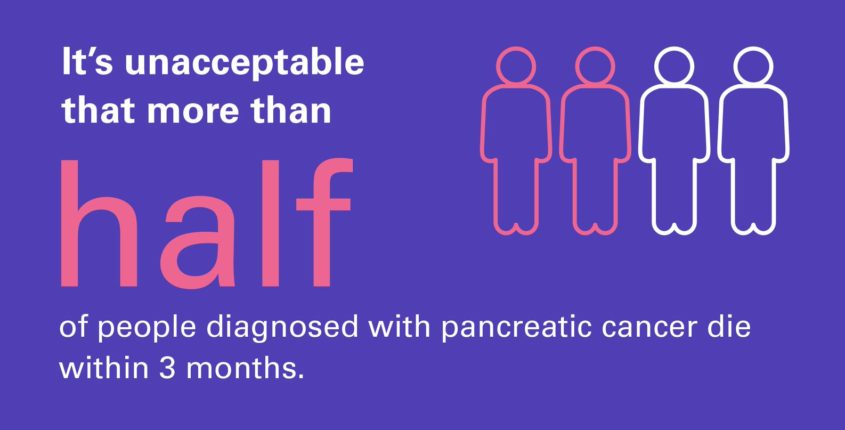How we’re taking on the early diagnosis challenge
80% of people are diagnosed with pancreatic cancer when it’s too late for life-saving surgery. This is because there is no simple test.
The challenge is clear: we need to understand how to diagnose pancreatic cancer earlier to give more people a chance of survival.

Investment in early diagnosis research is critical
Earlier diagnosis of pancreatic cancer is one of the most important challenges facing pancreatic cancer researchers, and has been for decades.
However, pancreatic cancer has been historically underfunded with only 3% of the annual UK cancer research budget being directed towards pancreatic cancer. Similar numbers of people die from pancreatic cancer as they do from breast cancer each year. And yet, pancreatic cancer research receives 93% less funding than breast cancer.
With your support we can tackle early diagnosis.

The approach to early diagnosis research must change
Thanks to our kind supporters, Pancreatic Cancer UK has always been committed to researching and improving early diagnosis, but now it’s time to step it up a level. Previous investments in early diagnosis research have been too small, infrequent and isolated, meaning that the best efforts of researchers have yet to succeed.
To solve this problem, we’re taking a different approach. Through our Early Diagnosis Research Alliance (EDRA), we have brought together the best minds in early diagnosis, bringing fresh new perspectives to address key challenges so that we can achieve earlier diagnosis in pancreatic cancer, faster.
This represents the single biggest investment in early diagnosis within pancreatic cancer in the UK.
The four keys areas the Alliance is looking at are:
- Equipping GPs with the tools to make accurate decisions on the need for further tests or referral to a specialist
- Enhancing biomarker tests from blood or urine, leading to the development of a simple test
- Providing evidence for implementation into UK healthcare settings
- Mapping out a diagnostic pathway so that these tools can be implemented in the NHS
Now is the time to do things differently because without collaboration, there will be many more decades of poor diagnosis ahead.
An exciting breakthrough
This pioneering research is close to the biggest and most exciting breakthrough we’ve ever seen – the first effective test to detect pancreatic cancer in the blood. Preliminary results show that the test is currently showing greater than 95% accuracy in early trials, meaning we are one step closer to making progress on one of the biggest challenges in pancreatic cancer research and ultimately, saving more lives. This pioneering blood test for pancreatic cancer is now being tested in real-world settings in the USA, in partnership with Immunovia.
Leading the way
Seizing every opportunity
Alongside the EDRA’s work, we’re also funding a series of ground-breaking new projects to take on early diagnosis at every opportunity:
Using QCancer to aid diagnosis
At the University of Oxford, Professor Julia Hippisley-Cox’s team is improving QCancer, a tool used by GPs to aid diagnosis. By analysing data from 24,326 people with pancreatic cancer, the team pinpointed alarm symptoms that should trigger immediate action and urgent referral for further investigation. This could lead to life-saving earlier diagnoses.
Identifying accurate biological markers
This year, Professor Justin Hsuan’s team identified some of the world’s most accurate biological markers, which indicate the presence of pancreatic cancer. In time, this may help doctors to detect pancreatic cancer a year earlier.
Supporting the EUROPAC study
We are continuing to support the European Registry of Hereditary Pancreatitis and Pancreatic Cancer (EUROPAC). People who may be at higher risk of pancreatic cancer due to factors such as their family history will be assessed, and those found to be at increased risk will be offered regular screening. The results of this study will help us to learn more about the genetic causes of pancreatic cancer, and may also lead to the development of new screening programmes to detect pancreatic cancer at an early stage.
The future of the early diagnosis research
Thanks to our supporters, we are making great strides in early diagnosis research. But we mustn’t stop there. More work is needed to take any breakthroughs out of the lab and into the hands of GPs. Your support will continue to be critical to help us maintain momentum and spearhead the next stage of ground-breaking research into early diagnosis.